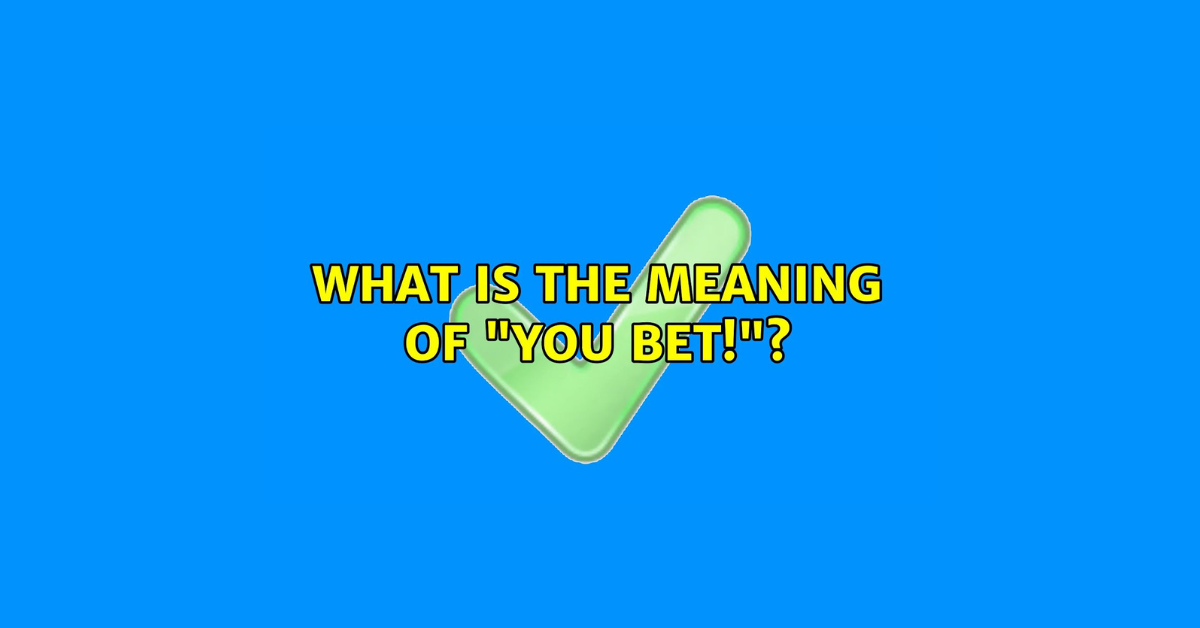The Origins of “You Bet”
The exact origins of the colloquial phrase “You bet” remain somewhat unclear. However, it is believed to have originated in the United States in the early 20th century. The expression is thought to have emerged as a casual and affirmative response to a statement or question.
While the precise moment of its inception remains elusive, linguistic experts speculate that “You bet” may have evolved from earlier phrases like “You may bet on that” or “You can bet on it.” Over time, the expression has become ingrained in everyday conversation, signifying agreement, certainty, or willingness.
Understanding the Context of “You Bet”
In everyday conversations, the phrase “you bet” is often used as a straightforward affirmation or agreement. It is a casual and colloquial way for someone to express certainty or willingness in response to a statement or question. The phrase is commonly used in English-speaking countries and has a light-hearted tone that conveys a sense of confidence and enthusiasm in conversation.
The context in which “you bet” is used can vary depending on the situation. It can be employed in a casual setting among friends or colleagues to show agreement or assurance. Additionally, the phrase can also be used in a more formal context to express polite acknowledgment or affirmation. Overall, the versatility of “you bet” allows it to be used in a wide range of social interactions, making it a versatile and widely understood expression.
Different Interpretations of “You Bet”
One common interpretation of the phrase “You bet” is as a simple affirmative response, similar to saying “yes” or “absolutely.” In this context, it is often used to express agreement or certainty in a casual manner. For example, if someone asks if you enjoyed a movie, responding with “You bet” indicates that you did, without the need for further elaboration.
Another interpretation of “You bet” is that it can convey a sense of gratitude or appreciation. This usage is often seen in response to a favor or kind gesture, where the speaker is expressing thanks or acknowledging the other person’s thoughtfulness. For instance, if a friend offers to help you with a task and you respond with “You bet,” it not only signifies your acceptance of the assistance but also conveys a sense of gratitude for their offer.
Cultural Significance of “You Bet”
The phrase “You bet” holds a significant place in the cultural lexicon of many English-speaking societies. It is commonly used as a casual affirmation or agreement in response to a statement or question. The informal nature of this phrase reflects a sense of camaraderie and friendliness in conversation, often serving as a way to express confidence or assurance in one’s response.
In addition to its everyday usage, “You bet” can also be seen as a reflection of the values and norms of a particular culture. Its simplicity and directness contribute to its appeal as a straightforward and honest form of communication. The phrase’s widespread popularity suggests that it resonates with people across various social contexts, highlighting its universal appeal as a linguistic expression of agreement and affirmation.
Usage of “You Bet” in Different Situations
In informal conversations, “You bet” is often used as a colloquial way to express agreement or confirmation. For example, if someone asks, “Are you coming to the party tonight?” and you reply with “You bet,” you are essentially saying “Yes, I will definitely be there.” This usage of “You bet” is commonly seen in casual interactions among friends and family members.
On the other hand, in more formal settings such as business meetings or professional emails, using “You bet” may come across as too casual or even inappropriate. It’s important to be mindful of the context in which you use this phrase to ensure that it aligns with the level of formality required. Consider using alternative phrases like “Certainly” or “Of course” in professional scenarios to convey a similar sense of agreement without sounding overly informal.















